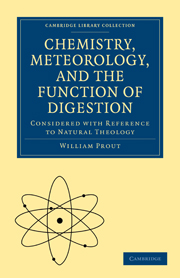Book contents
- Frontmatter
- TO THE READER [FIRST EDITION]
- TO THE READER [SECOND EDITION]
- Contents
- Dedication
- INTRODUCTION
- BOOK I OF CHEMISTRY
- BOOK II OF METEOROLOGY
- BOOK III OF THE CHEMISTRY OF ORGANIZATION
- CHAPTER I OF THE NATURE AND COMPOSITION OF ORGANIZED BODIES IN GENERAL, AS COMPARED WITH INORGANIC MATTER
- CHAPTER II OF THE MODES OF NUTRITION; COMPREHENDING A SKETCH OF THE ALIMENTARY APPARATUS; AND OF ALIMENTARY SUBSTANCES IN PLANTS AND IN ANIMALS
- CHAPTER III OF THE DIGESTIVE PROCESS; AND OF THE GENERAL ACTION OF THE STOMACH AND THE DUODENUM
- CHAPTER IV OF THE PROCESSES OF ASSIMILATION SUBSEQUENT TO THOSE IN THE STOMACH AND ALIMENTARY CANAL; PARTICULARLY OF THE CONVERSION OF THE CHYLE INTO BLOOD. OF RESPIRATION AND ITS USES. OF SECRETION. OF THE FINAL DECOMPOSITION OF ORGANIZED BODIES. GENERAL REFLECTIONS AND CONCLUSION
- APPENDIX
CHAPTER IV - OF THE PROCESSES OF ASSIMILATION SUBSEQUENT TO THOSE IN THE STOMACH AND ALIMENTARY CANAL; PARTICULARLY OF THE CONVERSION OF THE CHYLE INTO BLOOD. OF RESPIRATION AND ITS USES. OF SECRETION. OF THE FINAL DECOMPOSITION OF ORGANIZED BODIES. GENERAL REFLECTIONS AND CONCLUSION
Published online by Cambridge University Press: 29 August 2010
- Frontmatter
- TO THE READER [FIRST EDITION]
- TO THE READER [SECOND EDITION]
- Contents
- Dedication
- INTRODUCTION
- BOOK I OF CHEMISTRY
- BOOK II OF METEOROLOGY
- BOOK III OF THE CHEMISTRY OF ORGANIZATION
- CHAPTER I OF THE NATURE AND COMPOSITION OF ORGANIZED BODIES IN GENERAL, AS COMPARED WITH INORGANIC MATTER
- CHAPTER II OF THE MODES OF NUTRITION; COMPREHENDING A SKETCH OF THE ALIMENTARY APPARATUS; AND OF ALIMENTARY SUBSTANCES IN PLANTS AND IN ANIMALS
- CHAPTER III OF THE DIGESTIVE PROCESS; AND OF THE GENERAL ACTION OF THE STOMACH AND THE DUODENUM
- CHAPTER IV OF THE PROCESSES OF ASSIMILATION SUBSEQUENT TO THOSE IN THE STOMACH AND ALIMENTARY CANAL; PARTICULARLY OF THE CONVERSION OF THE CHYLE INTO BLOOD. OF RESPIRATION AND ITS USES. OF SECRETION. OF THE FINAL DECOMPOSITION OF ORGANIZED BODIES. GENERAL REFLECTIONS AND CONCLUSION
- APPENDIX
Summary
1. Of the Passage of the Chyle from the Alimentary Canal into the Sanguiferous System; and of the Function of Absorption generally.—The Chyle, as we have already said, is taken up from the alimentary canal, by numerous minute tubes, named lacteals; these tubes being part of the system of similar tubes, which arise from all parts of the body, and are termed absorbents. The whole of the absorbing tubes, after passing through various glands, at length unite into one or two of larger size; the recipient tube on the left side being by far the largest, and known by the appellation of the thoracic duct. These larger absorbent tubes pour their contained fluids into the veins named the sub-clavian; and thus into the general mass of the blood. The exact nature of the changes which the chyle and the lymph undergo in their passage through these tubes, is not well understood. One change appears to be, that the chyle, as first formed in the alimentary canal, is to a certain extent, completed, or freed from water, during its course through the lacteals: for though, when the chyle is mixed with the blood, its albuminous principles are much less perfectly developed than the principles of the blood itself; yet the developement of the albuminous principles, on their mixture with the blood, is more perfect, than when the chyle is first taken up from the alimentary canal.
- Type
- Chapter
- Information
- Chemistry, Meteorology and the Function of Digestion Considered with Reference to Natural Theology , pp. 519 - 558Publisher: Cambridge University PressPrint publication year: 2009First published in: 1834



